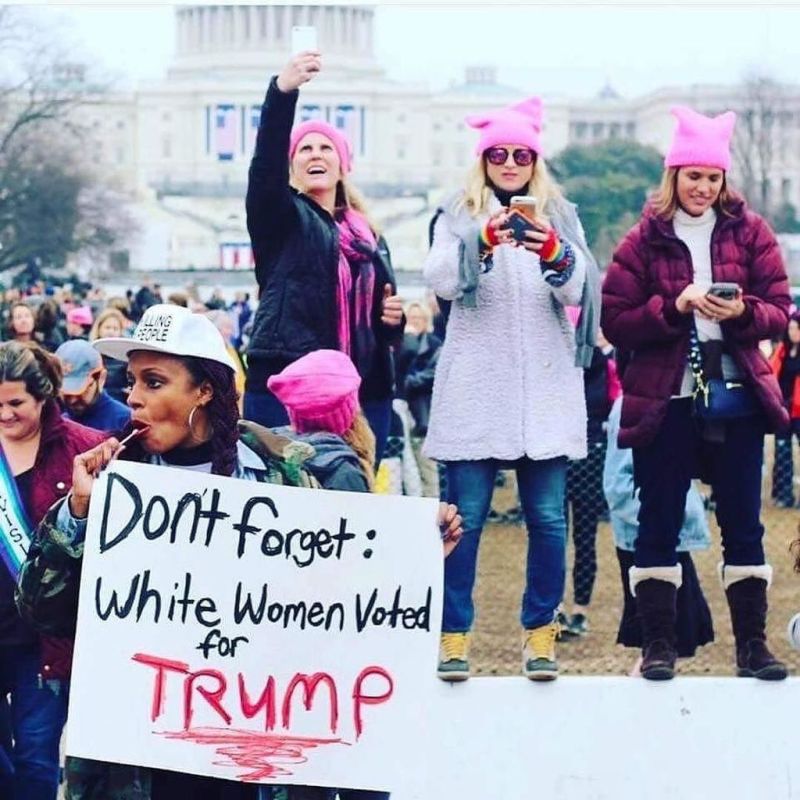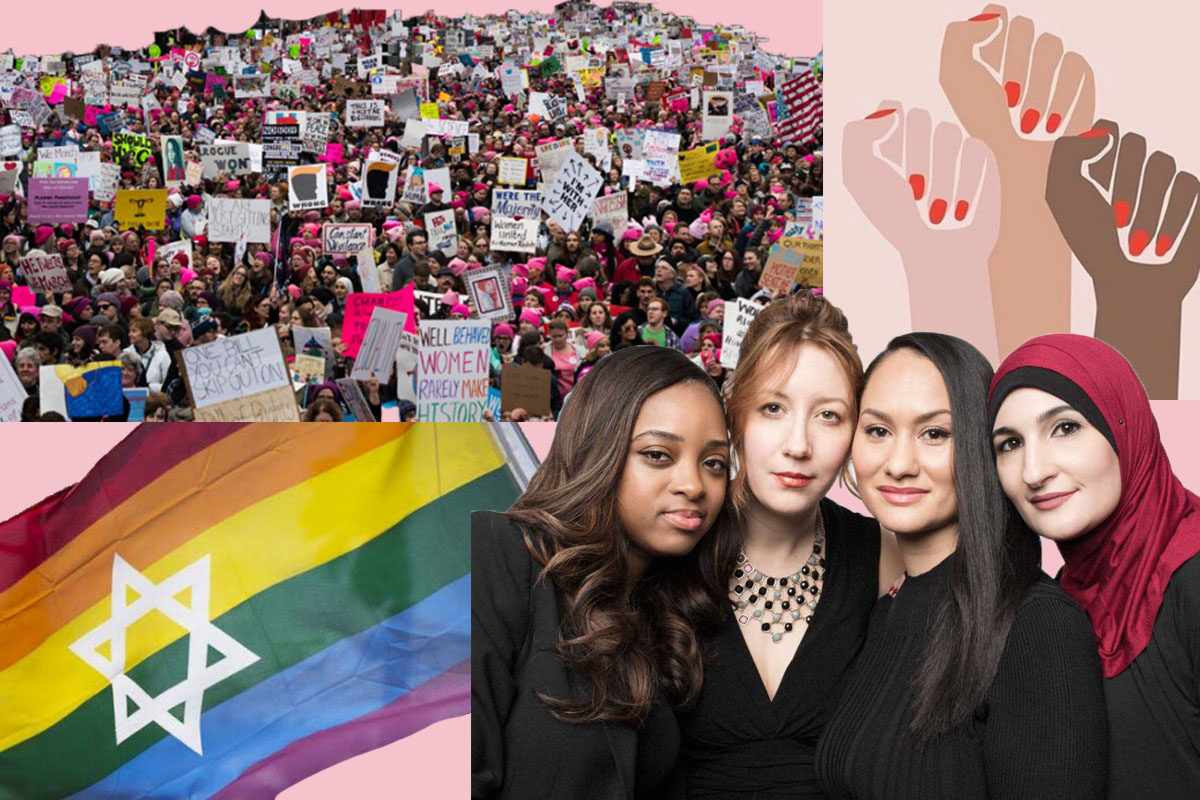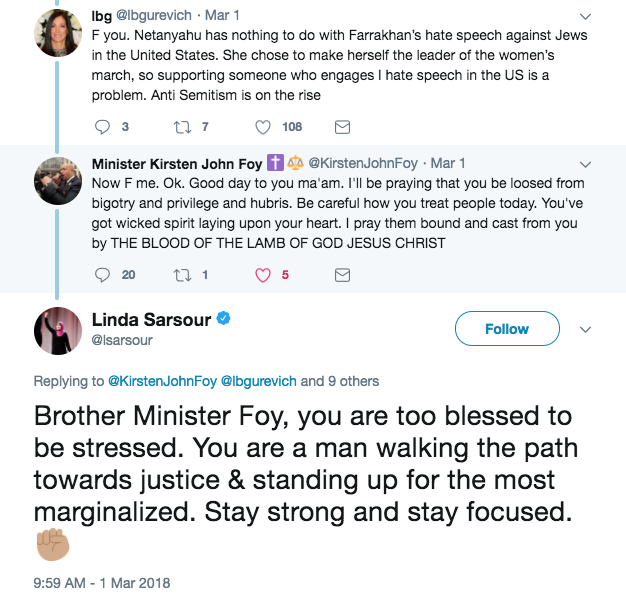Note: This was published March 5, 2018. For updates on this story, check out Alyssa Milano’s feelings on the matter as well as a statement from the Women’s March.
Many believe the Women’s March leadership has an anti-Semitism problem. They have consistently refused to denounce anti-Semitic remarks, and in doing so, have failed Jews (and particularly Jews of color) in their movement.
Let’s break it down for you…
The Women’s March 2017
The day after the 2016 election, women created Facebook events to march on Washington. The idea stemmed from a secret Facebook group called “Pantsuit Nation,” where a post by Hawaiian grandma Teresa Shook was shared, where she suggested that “we should march” the day after the inauguration. This led to hundreds of Facebook events for local marches.
Bob Bland, Evvie Harmon, Fontaine Pearson, and Breanne Butler decided to consolidate those Facebook events/pages and started planning a big march. Bob (remember her name, she comes back into the story later) recounts, “We had just jumped into it together as folks who had never done something like this before. We then noticed, ‘Oh, we’re all just a bunch of white women.’” Bob and her team brought on Tamika Mallory, Carmen Perez, and Linda Sarsour as National Co-Chairs. So the four co-chairs of the march: Bob, Tamika, Carmen, and Linda.
View this post on Instagram
The historical march the day after Trump’s election brought between 400,000 and 500,000 people to Washington D.C. While for many, this march was an empowering and beautiful show of solidarity and resistance, for others, it was an example of white feminism.

After the March
The organization pivoted. Their Unity Principles read:
We believe that Women’s Rights are Human Rights and Human Rights are Women’s Rights. We must create a society in which women – including Black women, Native women, poor women, immigrant women, disabled women, Muslim women, lesbian queer and trans women – are free and able to care for and nurture their families, however they are formed, in safe and healthy environments free from structural impediments.
They have points about ending violence, reproductive rights, LGBTQIA rights, worker’s rights, civil rights, disability rights, immigrant rights, and environmental justice. Nowhere are Jews mentioned — not saying this is anti-Semitic, but just pointing it out.
As Lily Herman writes in Refinery29, “Despite all the talk about intersectionality, many of these people think it’s perfectly acceptable to leave out Judaism, often for reasons that have nothing to do with faith itself or the reasons why Jews have been brutalized for centuries.”
International Women’s Strike
Less than two months after the Women’s March, on International Women’s Day, the strike took place on March 8, 2017. The Women’s March threw their full support behind this strike (#DayWithoutaWoman).
The platform for this strike included a plank on “an Antiracist and Anti-imperialist Feminism.” While starting promisingly — “Against the open white supremacists in the current government and the far right and anti-Semites they have given confidence to, we stand for an uncompromising anti-racist and anti-colonial feminism” — this ended with “Justice for Palestine are for us the beating heart of this new feminist movement.”
Which raised a lot of questions: What does Justice for Palestine look like? Does it mean the end of the state of Israel? Again: not saying this is anti-Semitic, but anti-Zionism slips very, very quickly into anti-Semitism. And, Israel was the only country singled out in the charter. Emily Shire wrote an op-ed in the New York Times asking, “Does Feminism Have Room for Zionists?” Shire writes, “I find it troubling that embracing such a view is considered an essential part of an event that is supposed to unite feminists. I am happy to debate Middle East politics or listen to critiques of Israeli policies. But why should criticism of Israel be key to feminism in 2017?”
Shire’s essay sparked debate: If opposition to Israel is important for being feminist, where do Jews fit in?
Sarsour responded in the Nation: “You either stand up for the rights of all women, including Palestinians, or none. There’s just no way around it.” Which doesn’t quite answer the question, but she emphasizes that you cannot be Zionist and feminist.
(Remember, Zionism is simply defined as the belief that the state of Israel should exist.)
The moral of this: Jews in progressive movements are expected to have a viewpoint on Israel. Jewishness and Zionism are seen as outside of intersectionality; as Lily Herman tweeted, “all Jews—regardless of their backgrounds—are automatically expected to have an educated viewpoint on Israel.” Similarly, Mia Brett tweeted, “to assume Zionism and feminism are incompatible decontextualizes the Israeli-Palestinian conflict and misunderstands Zionism. Israel is a country that provides refugee status for LGBT Palestinians and has long had women in positions of power…”
Dyke March 2017
Let’s turn to Chicago and the Dyke March. (The Women’s March was often linked to the Dyke March in online discourse, which is why we’re including it here.)
On June 24, around 1,500 people marched in Chicago in support of LGBTQ rights. As the Windy City Times reported, the Dyke March Collective “ejected three people carrying Jewish Pride flags (a rainbow flag with a Star of David in the center).” The three woman — Laurel Grauer, Eleanor Shoshany Anderson, and Ellie Otra — repeatedly explained they were there celebrating their queer Jewish identities.
Grauer explained, “It was a flag from my congregation which celebrates my queer, Jewish identity which I have done for over a decade marching in the Dyke March with the same flag.” Anderson reiterated this in an interview with the Daily Beast, saying, “I just said, ‘I’m here as a Jew. I’m here as a Jew.’’ Similarly, Otra wrote on Facebook, “I wanted to be in public as a gay Jew of Persian and German heritage. Nothing more, nothing less. So I made a shirt that said ‘Proud Jewish Dyke’ and hoisted a big Jewish Pride flag — a rainbow flag with a Star of David in the center, the centuries-old symbol of the Jewish people”
But the Dyke March organizers took their Jewish pride flags as Israeli flags, and asked them to leave.
Otra further explained: “I was thrown out of Dyke March for being Jewish. And yes, there were other Jews there, visible ones even, who weren’t accosted, who had fun, even! And yes, Israel exists in a complicated way. But in this case, it doesn’t matter what Israel does or doesn’t do. This was about being Jewish in public, and I was thrown out for being Jewish, for being the “wrong” kind of Jew, the kind of Jew who shows up with a big Jewish star on a flag.”
The reporter, Gretchen Rachel Hammond, was removed from her job because of that article. As Hammond explained to JTA, “They have chosen to exercise their anger against Israel, but do it in an anti-Semitic way.”
As the Daily Beast wrote, the Dyke March “highlight[s] a problem with the treatment of Jews in some progressive circles: we are accepted only if we hold hostile views towards Israel and don’t vocalize concerns about Zionism.” Implying: You can only be Jewish in these marches, in these movements, if you have one view on Israel.
As Anderson (one of the women kicked out) said, she’s unsure if she’ll return, even after participating for many years. “I think I would feel physically unsafe if I came back with anything short of a forehead tattoo that said ‘Israel is the worst thing that has ever existed’ — and I am not going to play that game. I should be able to be there as a Jew without passing a test.”
Charlottesville
On August 11 and 12, 2017, Neo-Nazis convened on Charlottesville. As the Washington Post reported:
“The white nationalists brandished torches and chanted anti-Semitic and Nazi slogans, including ‘blood and soil’ (an English rendering of the Nazi ‘blut und boden’) and ”Jews will not replace us’ — all crafted to cast Jews as foreign interlopers who need to be expunged. The attendees proudly displayed giant swastikas and wore shirts emblazoned with quotes from Adolf Hitler. One banner read, ‘Jews are Satan’s children.'”
The Atlantic wrote: “The durability of anti-Semitic tropes, and the ease with which they slide into all displays of bigotry, is a chilling reminder that the hatreds of our time rhyme with history and are easily channeled through timeless anti-Semitic canards.”
Why is this relevant to the Women’s March? They consistently aren’t addressing anti-Semitism, even as it becomes an even bigger issue in the U.S. and around the world. For a movement that hails its inclusion and intersectionality, that somehow doesn’t include Jews.
In their nine Instagrams (their biggest platform) around Charlottesville, a single one mentions Jews. None mention anti-Semitism. We shouldn’t be searching and searching for an acknowledgement of Jews and anti-Semitism, when we know it’s real and it’s happening. Especially in the wake of Charlottesville.
Here’s a Jewish man featured:
The Women’s March, in its year and a half of existence, has tweeted about anti-Semitism a grand total of five times, and two are re-tweets of their Deputy Head of Communications Sophie Ellman-Golman. “Jewish” and “Jews” are tweeted about more — but not much (both only seven times). While numbers of tweets doesn’t correlate to actual guiding principles, anti-Semitism is mentioned nowhere on their website.
The Latest: Refusing to Denounce Farrakhan
Where does this leave us? Last week, Louis Farrakhan (a notorious anti-Semite) gave a speech where, among other anti-Semitic sentiments, he proclaimed, “the powerful Jews are my enemy,” the Jews have a grip on the media, and “the Jews were responsible for all of this filth and degenerate behavior that Hollywood is putting out turning men into women and women into men.” One of the co-chairs of the Women’s March, Tamika Mallory, was in attendance and has been vocal in her support for Farrakhan in the past.
Here, in an Instagram from May 2017, Tamika calls him the “greatest of all time”:
Tamika is not alone in her support for Farrakhan; Carmen Perez has posted about him praisingly, writing, “There are many times when I sit with elders or inspirational individuals where I think, ‘I just wish I could package this and share this moment with others.'” Similarly, Linda Sarsour (alongside Carmen and Tamika) participated in Farrakhan’s 2015 Rally #JusticeorElse.
So they’ve been cozy with noted anti-Semite Farrakhan for a while.
Yikes, right?
In response, many called on the Women’s March leadership to denounce Farrakhan.
there is nothing simplistic about asking if a person in a group leading a major progressive movement agrees with the violently anti-semitic statements of a known bigot who she openly supports. and as a jew, i resent being made to feel like this is unreasonable request. https://t.co/KxDymtPZ9a
— marisa kabas (@MarisaKabas) March 5, 2018
Instead, the four co-chairs — Tamika, Linda, Carmen, and Bob — doubled-down on refusing to denounce him. Tamika tweeted, “If your leader does not have the same enemies as Jesus, they may not be THE leader!” As many pointed out: This is an anti-Semitic dog-whistle (Jews as the enemies of Jesus/Christianity).
I am broken up over the ways the @womensmarch keeps betraying Jewish women.
We deserve better.
— Rabbi Ruti Regan 🏳️🌈♀🇺🇸 (@RutiRegan) March 2, 2018
When someone tweeted to Tamika asking, “Just wondering if bigotry is only a problem when aimed at black or brown people. Why do you support Farrakhan? Hate speech toward Jews is great?” Minister Kirsten John Foy jumped in and responded, “Why do you support Netanyahu?” Here’s the rest of the exchange (with an appearance from Linda Sarsour):
As one journalist, Yair Rosenberg, summed up, this exchange: “1. Jew asks @womensmarch co-chair why she supports American anti-Semite Louis Farrakhan 2. Anti-Semite replies “but Israel,” as if that justifies Farrakhan’s hate, then calls for Jesus to cast “wicked spirit” out of the Jew 3. Linda Sarsour interjects to defend … the anti-Semite”
This is the gist of the problem, as one blogger succinctly points out:
Leftists don’t like thinking about antisemitism in their own ranks. At the same time, they’d never admit this is so. Fortunately, most antisemitism controversies that implicate the left relate to Israel in some fashion, and so they can respond with their favorite chestnut: “criticism of Israel isn’t antisemitic.” On face, this response assures the audience that they do care about antisemitism (the “real” antisemitism), but that the case at hand doesn’t count as such (that it never seems to count as such is suspicious in its own right. But leave that aside.).
But Farrakhan’s antisemitism isn’t really tied to Israel. Which means that the stand-by response won’t work. And these leftists are left flummoxed, because they don’t really have another thought on antisemitism beyond “criticism of Israel isn’t.” Forced into a situation where it seems necessary to say something else, they find themselves at a loss. Suddenly, they can’t play their get-out-of-talking-about-antisemitism-free card.
And this is revealing. If the problem really was Israel, the Farrakhan case shouldn’t present any difficult. But if the problem is that these leftists just don’t want to have to reckon with antisemitism in their community (and Israel is a convenient but ultimately epiphenomenal factor), then Farrakhan presents a huge problem.
By refusing to discount Farrakhan’s anti-Semitism (and homophobia and transphobia and so much other stuff), the leaders of the Women’s March cannot claim to lead a progressive movement.
Breaking News: There are Jewish, LGBT+, transgender, and female black people! Louis Farrakhan has railed against all of these people, so no, he has not been a champion or positive figure for ALL black people.
— diane 👩🏾💻 (@dianelyssa) March 3, 2018
And, as Refinery29 writes, “This also doesn’t even begin to describe the erasure of Jews of color from practically every American narrative; as Diane Alston noted, there are Black Jews who are more directly impacted by Farrakhan’s words, not to mention Black members of the LGBTQ community and other groups who’ve been targeted by the Nation of Islam leader in the past. What do the Women’s March leaders say to them?”
What’s next?
This problem keeps popping up. As someone tweeted back in August after Charlottesville:
Will you FINALLY add Jews to your platform? Reject litmus tests for participation? Reject anti-semitism in your midst?
— Carly Pildis (@CarlyPildis) August 13, 2017
They didn’t add Jews to their platform, reject litmus tests for participation, or denounce anti-Semitism in their movement back in August. They didn’t do it in the wake of the Chicago Dyke March controversy, or after International Women’s Strike. So, sadly, we’re not surprised that they are still refusing to denounce anti-Semitism.
The Women’s March has an opportunity now to do what they haven’t in the past: denounce anti-Semitism. Take the concerns of Jews seriously. Stop conflating Jews with Israeli policy.
In the meantime, as Lily Herman wrote in Refinery29, “regardless of what the Women’s March leaders say (and don’t say) about us, I hope folks who are marginalized in this country know this: I, and so many other Jews, will always march with you, too.”
Amen.




